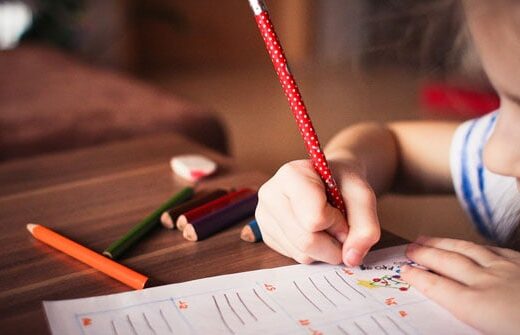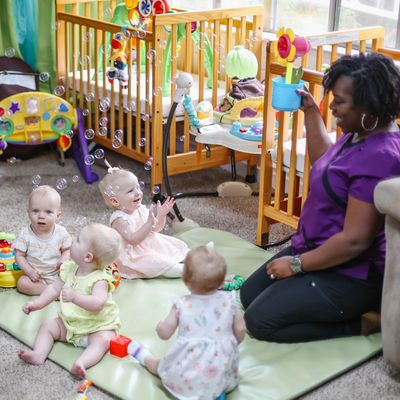Interactive technology that enhances student learning at Private Grade School Peoria
The Relevance of Interactive Activities in Elementary School Education And Learning
Interactive activities play an essential function in grade institution education and learning. They engage students and enhance finding out outcomes. Via team tasks and hands-on experiments, students experience the product in a sensible method. This approach deals with varied understanding styles and promotes vital skills. However, the benefits expand beyond academics. Exploring the deeper impact of these tasks exposes their value in shaping young learners' futures. What makeovers happen when trainees proactively take part?
Enhancing Interaction Via Interactive Knowing
Standard mentor approaches have their benefits, interactive learning substantially improves student interaction in grade school education and learning. This strategy encourages energetic participation, permitting students to immerse themselves in the learning process. By making use of group activities, hands-on experiments, and technology-driven sources, educators create an environment where students really feel more linked to the product.
Interactive knowing promotes collaboration amongst peers, fostering interaction abilities and team effort. It likewise accommodates diverse learning styles, making sure that aesthetic, auditory, and kinesthetic learners can all thrive. Trainees are a lot more most likely to preserve details when they proactively participate, as opposed to passively obtaining understanding.
This vibrant approach not only makes finding out pleasurable but likewise infuses a sense of ownership in students regarding their academic journey. As they involve with the content, their interest and motivation to learn rise, laying a solid structure for future academic success.
Establishing Critical Thinking Skills
Interactive discovering not just improves interaction however likewise serves as a driver for developing crucial thinking skills in elementary school pupils. With activities such as problem-based learning, arguments, and hands-on experiments, trainees are encouraged to assess info, assess various perspectives, and develop reasoned final thoughts. These interactive experiences call for trainees to question presumptions, leading them to believe more deeply regarding different topics.

Interactive activities typically present real-world circumstances that test students to apply their understanding creatively. By maneuvering with these challenges, they discover to recognize appropriate info and make informed choices. This procedure cultivates not only specific essential thinking however likewise urges students to verbalize their assumed procedures, enhancing their ability to interact properly. Consequently, interactive learning settings grow a generation of vital thinkers that are better prepared to deal with complicated problems in their future scholastic and expert endeavors.
Cultivating Collaboration Amongst Peers
Fostering cooperation among peers is essential in quality institution education and learning, as it boosts synergy and interaction abilities. Taking part in group activities assists trainees develop count on and regard for each other, preparing for effective cooperation. In addition, analytical with each other allows pupils to find out from each other and create a collective technique to obstacles.
Teamwork and Communication Skills
Reliable synergy and communication abilities are necessary parts of a successful quality school education. Participating in interactive activities encourages pupils to team up, share concepts, and address issues together. Such experiences promote the development of critical interaction capacities, allowing youngsters to reveal their thoughts plainly and listen proactively to others. Via team effort, pupils discover to appreciate varied viewpoints, fostering a sense of area and shared duty. Structured group jobs, whether in academics or creative tasks, boost peer communications, educating kids how to bargain functions and fix disputes. Consequently, these skills not just contribute to a positive classroom atmosphere yet likewise prepare pupils for future joint undertakings in higher education and the work environment. In general, teamwork and interaction are foundational to holistic development in elementary school.
Building Trust and Respect
Building trust fund and regard amongst peers acts as a foundation for successful partnership in elementary school environments. When pupils feel valued and appreciated by their schoolmates, they are most likely to involve proactively in group activities. Interactive activities, such as group tasks and participating games, offer possibilities for students to pick up from each other, fostering a sense of neighborhood. This atmosphere urges open communication, permitting students to express their concepts and opinions without fear of judgment. As trust builds, students end up being more happy to share duties and support each other's knowing. Eventually, cultivating an atmosphere of depend on and regard improves not just scholastic results however likewise social advancement, outfitting trainees with necessary interpersonal abilities for their future undertakings.
Problem-Solving With each other
Joint analytical engages trainees in vital thinking and teamwork, crucial abilities for their scholastic and individual growth. When trainees interact to take on challenges, they discover to connect properly, respect varied perspectives, and take advantage of each various other's strengths. This procedure improves their ability to examine problems from different angles and develop imaginative options. Group tasks, such as scientific research experiments or mathematics obstacles, promote energetic engagement and foster a sense of community. As students work together, they additionally construct social abilities, finding out to discuss and jeopardize, which are important for future communications. Inevitably, analytical with each other cultivates a supportive understanding environment, empowering pupils to take ownership of their education and learning while preparing them for collaborative endeavors past the classroom.
Encouraging Creative Thinking and Technology
Urging creativity and development in elementary school education and learning can be substantially boosted via hands-on understanding experiences. These tasks enable students to engage straight with products and concepts, promoting creative reasoning. Additionally, collaborative team projects can boost diverse concepts and services, additionally nurturing an imaginative setting.
Hands-On Learning Knowledge
A plethora of hands-on learning experiences substantially enhances creativity and advancement in grade college education. Engaging trainees in practical activities permits them to use academic understanding in real-world contexts, promoting deeper understanding. By manipulating devices and materials, children develop crucial analytic skills and find out to believe outside the box. These experiences influence interest and encourage trainees to explore their rate of interests further. Additionally, hands-on tasks can bridge numerous topics, connecting scientific research, art, and mathematics in meaningful methods. This interdisciplinary strategy motivates pupils to see connections and think artistically. Eventually, hands-on discovering experiences support a generation of pioneers, equipping them with the skills and self-confidence needed to take on future obstacles and add to culture in special methods.
Collaborative Group Projects
Hands-on learning experiences normally cause the unification of joint team projects, which play an essential duty in promoting imagination and advancement in elementary school education. These projects urge trainees to function with each other, sharing ideas and viewpoints, which enhances analytic abilities and crucial thinking. Via partnership, trainees learn to communicate efficiently and respect diverse point of views, necessary skills for their future. In addition, group jobs offer opportunities for trainees to trying out different roles, boosting their adaptability and self-confidence. Engaging in this cooperative setting permits them to explore their creative thinking, pushing the limits of typical understanding. Ultimately, collective team Private School jobs not just enrich the instructional experience yet also prepare students for real-world obstacles that need synergy and ingenious reasoning.
Building Self-confidence and Independence
As trainees participate in interactive activities, they usually uncover opportunities to develop self-confidence and freedom. These tasks, whether they include hands-on tasks, role-playing, or analytical jobs, urge pupils to take initiative and reveal their ideas honestly. By joining such experiences, trainees find out to trust their capacities and choose without relying solely on guidance from educators or peers.
Interactive tasks cultivate a sense of ownership over discovering. They develop vital believing skills and strength when students take on difficulties collaboratively or separately. This process not only boosts their understanding of the subject yet also encourages them to take risks in their knowing trip.
As they navigate numerous interactive circumstances, pupils gradually dropped their self-doubt, leading the way for increased self-confidence - Kindergarten. Inevitably, these activities play an essential role in supporting certain and independent learners, furnished to deal with future academic and individual difficulties
Developing a Favorable Classroom Environment
While promoting a favorable classroom setting is essential for reliable learning, it needs intentional initiative from educators to produce an area where trainees really feel secure, highly regarded, and involved. A favorable atmosphere motivates cooperation, permitting students to reveal themselves without fear of judgment.
Educators can achieve this by establishing clear expectations, promoting mutual respect, and acknowledging private contributions. Incorporating interactive activities better boosts interaction, making discovering more enjoyable and dynamic.
Additionally, a nurturing environment supports social-emotional development, as pupils learn to browse partnerships and settle conflicts. Educators play an essential duty in modeling positive behavior and reinforcing a culture of kindness and inclusivity.
Frequently Asked Questions

Exactly How Can Moms And Dads Assistance Interactive Knowing in the house?
Moms and dads can sustain interactive knowing in the house by offering appealing materials, motivating hands-on projects, integrating academic video games, fostering conversations, and producing a nurturing setting that advertises curiosity and expedition in their youngsters's finding out experiences. (Kindergarten)
What Types of Interactive Tasks Are Most Effective?
Hands-on jobs, collective video games, role-playing situations, and academic technology applications are amongst one of the most effective interactive tasks. These involve students, boost important assuming abilities, and advertise teamwork, inevitably cultivating a deeper understanding of numerous topics.
Just How Do Interactive Activities Accommodate Different Understanding Styles?
Interactive activities engage visual, auditory, and kinesthetic learners by integrating diverse approaches. These tasks assist in comprehending through hands-on experiences, collective conversations, and aesthetic help, permitting pupils to soak up details according to their favored discovering style.
What Are the Expenses Associated With Carrying Out Interactive Activities?

Carrying out interactive activities incurs costs such as products, training for educators, technology upgrades, and potential center adjustments. Spending plan constraints can additionally impact the frequency and selection of tasks offered to trainees in academic setups.
How Can Teachers Evaluate the Effect of Interactive Understanding?
Educators can evaluate the effect of interactive knowing through monitorings, pupil responses, performance metrics, and comparative evaluation of examination ratings prior to and after execution, making certain a complete understanding of interaction and knowledge retention improvements.
Via tasks such as problem-based understanding, discussions, and hands-on experiments, trainees are urged to analyze info, review various viewpoints, and create reasoned verdicts. Interactive tasks typically present real-world circumstances that test pupils to use their expertise creatively. Involving in interactive tasks motivates pupils to work together, share ideas, and fix issues together. Interactive activities, such as group projects and cooperative video games, supply chances for students to learn from one an additional, cultivating a feeling of community. As pupils involve in interactive tasks, they typically find chances to construct confidence and independence.